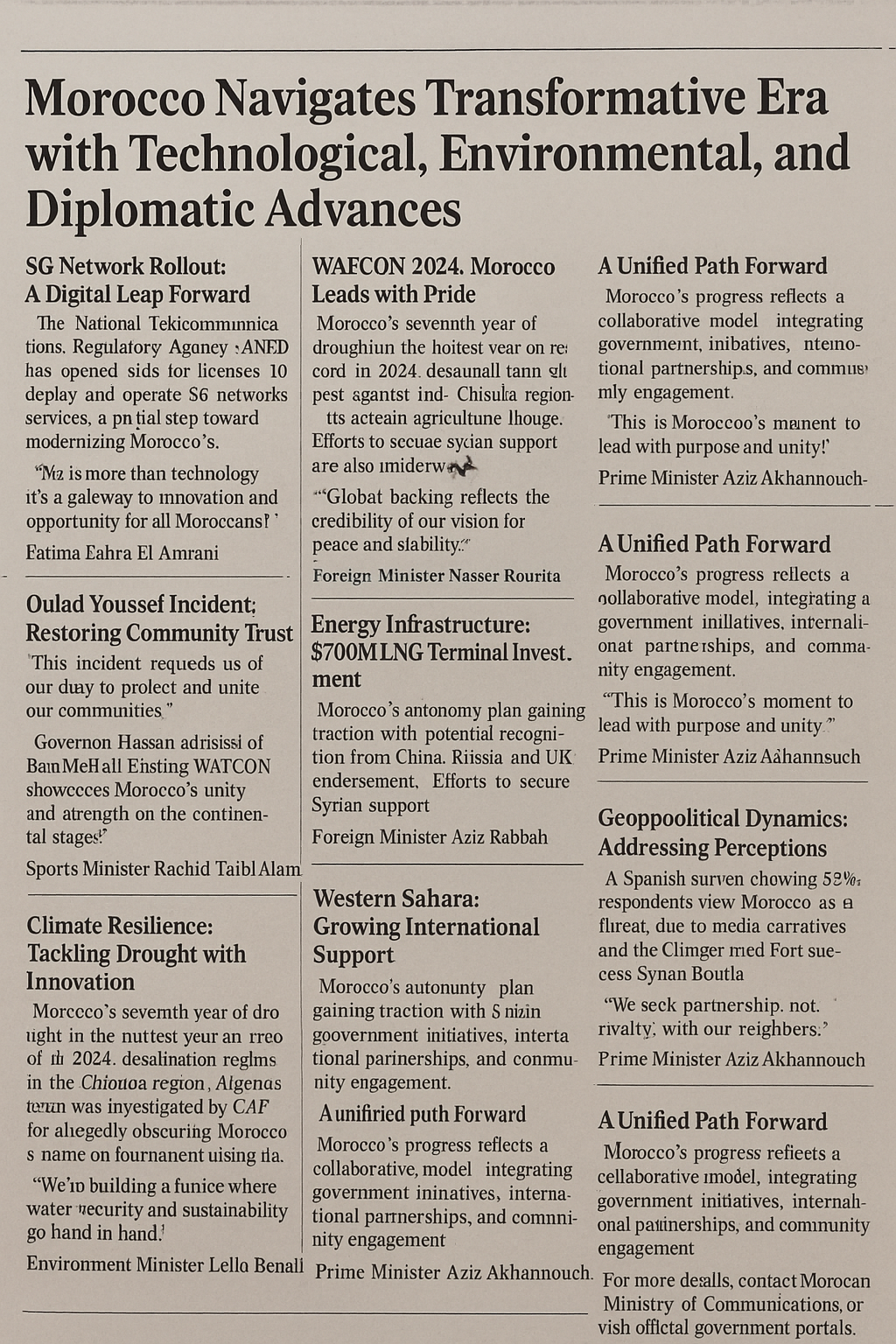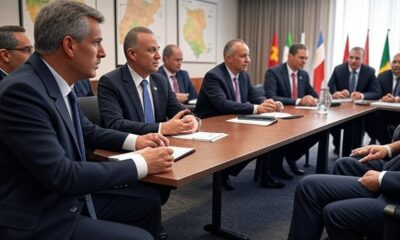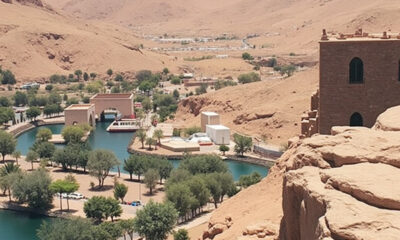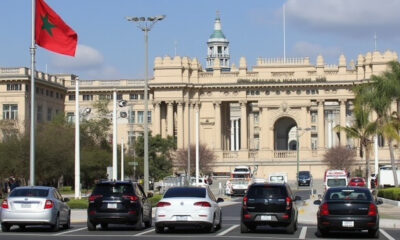International
Morocco Elected President of the UN Human Rights Council for 2024
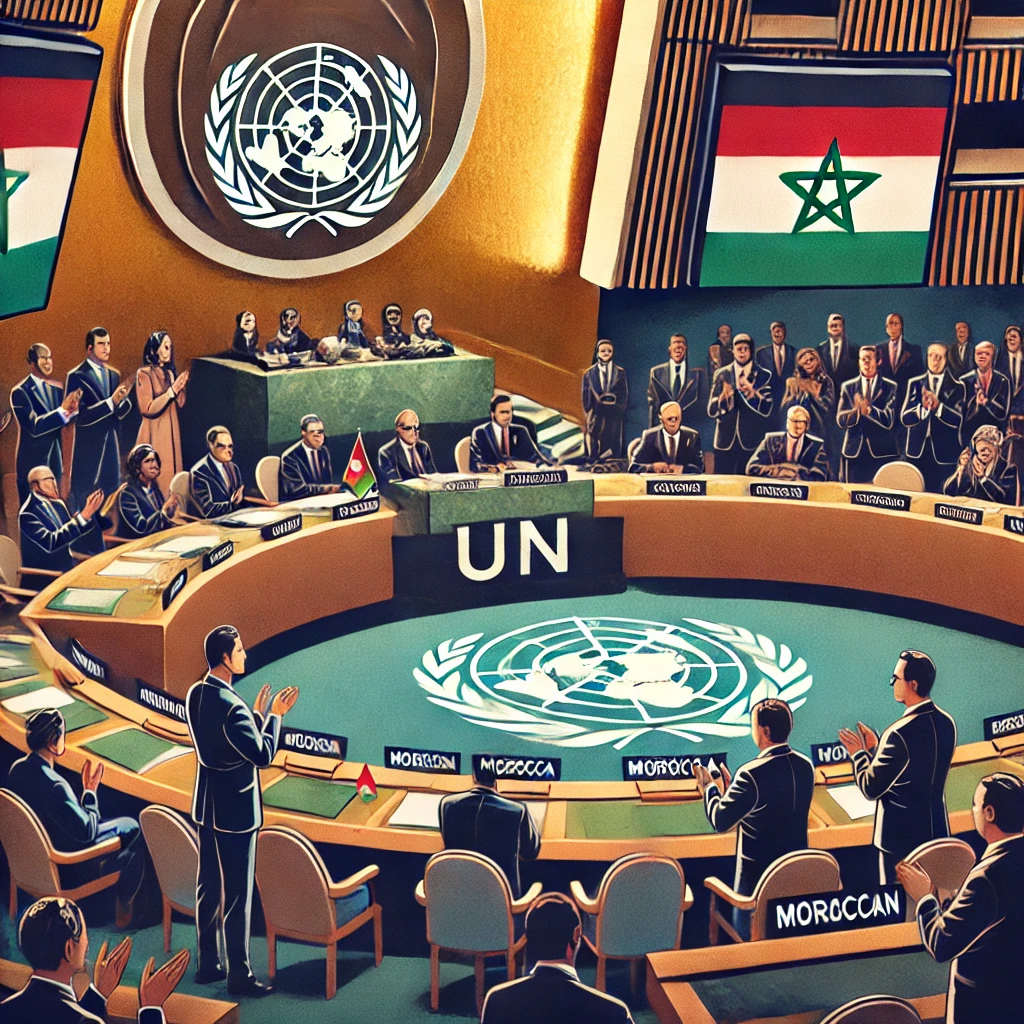
In a significant development for its diplomatic standing, Morocco has been elected as the president of the United Nations Human Rights Council (UNHRC) for the year 2024. This election, held through a rare secret ballot on October 1, 2024, marks an important milestone in Morocco’s evolving role in international diplomacy. The appointment of Morocco’s ambassador in Geneva as the council’s president is indicative of the confidence that member states have in Morocco’s leadership capabilities, especially in these challenging global times.
UN Human Rights Council: A Vital Global Platform
The UN Human Rights Council is one of the most influential bodies within the United Nations system, responsible for the promotion and protection of human rights around the world. Established in 2006, the Council consists of 47 member states elected on a rotating basis. The role of the presidency is crucial, as it involves setting the agenda, leading council meetings, overseeing resolutions, and steering the body towards addressing some of the world’s most pressing human rights issues. The council president serves as the face of global human rights discourse, representing the interests of vulnerable populations and working to resolve conflicts through diplomacy and dialogue.
The Election Process and Morocco’s Candidacy
Morocco’s election to the presidency of the UNHRC was the result of a secret ballot—a less common voting procedure for such positions. This type of election generally occurs when there is competition or when a consensus cannot be reached easily among member states. In this instance, Morocco emerged as the leading candidate, garnering the support of a majority of member states, demonstrating international faith in its leadership and the diplomatic skills of its representatives.
Morocco’s candidacy focused on highlighting its track record in promoting human rights within its own borders, as well as its consistent contributions to human rights causes on the international stage. Morocco’s ambassador to the UN in Geneva has been a key figure in these efforts, emphasizing dialogue, cooperation, and multilateralism as core tenets of his campaign.
Morocco’s Journey in Human Rights Advocacy
Morocco’s journey in human rights has been marked by significant progress over the last two decades. Once criticized for human rights abuses in the late 20th century, particularly during what are known as the “Years of Lead,” Morocco has since implemented extensive reforms. Under King Mohammed VI, Morocco has taken meaningful steps to modernize its institutions, promote social justice, and strengthen the rule of law. Initiatives such as the establishment of the Equity and Reconciliation Commission (IER) in 2004, which was tasked with addressing past human rights abuses, set the stage for an ongoing transformation in the country’s human rights landscape.
Moreover, Morocco has actively worked to improve the rights of women and children, emphasizing gender equality and economic empowerment as key elements of its policy framework. The Mudawana (Family Code), reformed in 2004, is often highlighted as a significant step towards gender equality, giving women more rights within marriage and family life. Morocco has also made strides in child protection laws and has been praised for its integration of international norms into domestic legislation.
Morocco’s Role in Regional Stability and Human Rights Promotion
Beyond its domestic efforts, Morocco has been a key player in promoting human rights and stability throughout the MENA (Middle East and North Africa) region. As a relatively stable country in a region often fraught with political unrest, Morocco has positioned itself as a mediator in regional conflicts. The country has hosted several international dialogues and peace-building initiatives aimed at promoting security and safeguarding human rights, particularly in areas affected by conflict.
Morocco’s contributions to migration and refugee issues have also garnered international recognition. Situated as a major transit country between Africa and Europe, Morocco has worked with both African and European partners to manage migration flows in a manner that respects the rights of migrants. The country was instrumental in hosting the Global Compact for Safe, Orderly and Regular Migration in 2018, underlining its commitment to improving conditions for migrants and refugees.
Challenges for Morocco as the UNHRC President
As president of the UN Human Rights Council, Morocco faces numerous challenges that require delicate diplomacy and a deep understanding of complex global dynamics. In recent years, the UNHRC has had to navigate some of the most contentious human rights issues, from systemic racism and inequality to severe conflicts in regions like Ukraine, Syria, and Myanmar.
One of the key areas Morocco will need to focus on is addressing human rights abuses in conflict zones. As the global political climate becomes increasingly polarized, the UNHRC’s role in holding countries accountable and encouraging adherence to international human rights standards has become more challenging. The Council often faces accusations of bias and political maneuvering, which makes consensus-building among its diverse membership particularly difficult.
Another challenge for Morocco will be bridging divisions between member states. The Council has historically seen tensions between countries from different blocs, particularly when it comes to sensitive issues such as civil liberties, political freedoms, and the role of governmental intervention. Morocco’s role will involve ensuring that the Council remains a platform for meaningful dialogue rather than allowing divisions to derail human rights efforts.
Morocco will also need to tackle the rights of marginalized communities, including refugees, LGBTQ+ populations, and ethnic minorities, ensuring that their voices are heard and that protections are strengthened. Climate change and its impact on human rights is another area of growing concern that the Council will need to address under Morocco’s leadership, particularly regarding climate refugees and the rights of those affected by environmental degradation.
Morocco’s Vision for the UNHRC
In its role as the Council’s president, Morocco is expected to champion several core issues:
- Strengthening Multilateral Dialogue: Morocco intends to use its presidency to strengthen dialogue between member states, focusing on achieving consensus on pressing human rights issues. This approach will emphasize negotiation, mediation, and the avoidance of confrontation.
- Promoting Social and Economic Rights: A significant part of Morocco’s focus will be on advancing social and economic rights, particularly in the context of post-pandemic recovery. Issues such as access to healthcare, education, and fair labor practices are likely to be prioritized as part of the broader global human rights agenda.
- Human Rights and Digital Transformation: Another area of focus will be the intersection between human rights and the digital transformation. With the rapid spread of technology, ensuring privacy, preventing digital surveillance abuses, and safeguarding freedom of expression online have become pressing concerns. Morocco is expected to promote discussions on how to balance technological advances with the need to protect individuals’ rights.
- Addressing Racism and Discrimination: With systemic racism and discrimination still prevalent in many parts of the world, Morocco’s presidency is likely to give special attention to initiatives aimed at combating these issues. This includes building upon past UNHRC efforts to tackle hate speech and ensuring that marginalized communities are protected under international law.
International Reactions to Morocco’s Election
Morocco’s election as the president of the UN Human Rights Council has been met with a mix of optimism and caution. Supporters argue that Morocco’s progress in human rights reform, coupled with its diplomatic credibility, positions it well to lead the Council during a complex global period. Its historical connection to both the Arab world and Africa gives Morocco a unique perspective on issues that are critical to these regions, which are often at the center of human rights debates.
However, some critics have raised concerns about Morocco’s internal human rights record, particularly regarding freedom of expression and the treatment of the Sahrawi population in Western Sahara. Human rights organizations have urged Morocco to use its presidency as an opportunity to reflect on and improve its domestic human rights situation while leading by example at the international level.
Conclusion
Morocco’s election to the presidency of the UN Human Rights Council is a significant achievement that highlights its growing influence on the international stage. The position brings with it both opportunities and challenges. Morocco will need to balance its leadership role in promoting global human rights standards with addressing criticisms about its own domestic record. If successful, Morocco could set a strong example of how countries in transition can both improve their internal human rights practices and play a leading role in promoting these values globally.
For further information, visit France 24.
International
New X Feature Reveals Where Users Really Are — And It’s Already Causing Chaos

November 25, 2025 – In a move to enhance transparency and curb the spread of bots and foreign influence on its platform, X (formerly Twitter) has launched a new “About This Account” feature that displays the country or region associated with user profiles. The tool, which rolled out widely in recent weeks, allows anyone to quickly check the origin of an account by tapping or hovering over the “Joined” date on a profile page. This comes amid growing concerns over online authenticity, especially in politically charged discussions.The feature pulls data from where the account was created or where it’s primarily active, providing a simple label like “United States” or “Europe.” X owner Elon Musk has touted it as a key step toward building trust, stating on the platform that it helps “expose fake accounts and foreign agitators.” Early adopters have praised it for its role in “instant bot detection,” with users reporting discoveries of profiles masquerading as locals but originating from distant regions.
Rollout and Initial Impact
The “About This Account” section was first tested on X employee profiles in October before a full launch in mid-November. However, the rollout wasn’t without hiccups—X briefly pulled the feature just hours after debut due to immediate backlash over privacy concerns, only to reinstate it shortly after. Since then, it has become a permanent fixture, also revealing additional details such as username change history and any connections to X’s premium services.The tool has already sparked heated debates. Proponents argue it reduces misinformation by highlighting potential foreign meddling; for instance, several accounts promoting political narratives, including pro-Palestinian voices and MAGA supporters, have been exposed as operating from countries like Pakistan, Bangladesh, Israel, or even Gaza—contradicting their portrayed identities. One viral thread highlighted “Gaza journalists” based overseas, fueling discussions about propaganda and influence operations.Critics, however, raise alarms about privacy and potential misuse. Some users worry it could lead to doxxing or harassment, especially for those in sensitive regions. Others note that savvy users might evade detection using VPNs, though X claims it’s refining its algorithms to improve accuracy. In response to feedback, the platform allows users to opt for a broader regional display (e.g., “Asia” instead of a specific country) to balance transparency with privacy.
Broader Implications for Social Media
This feature aligns with X’s ongoing efforts under Musk to prioritize free speech while tackling spam and inauthenticity. It arrives at a time when social platforms face scrutiny from regulators worldwide, including the EU’s Digital Services Act, which demands greater accountability for content moderation. Analysts suggest it could influence competitors like Meta’s Threads or Bluesky to adopt similar tools, potentially reshaping how users verify online identities.As global events like elections and conflicts amplify the role of social media, features like this could play a pivotal role in distinguishing genuine discourse from orchestrated campaigns. “It’s a double-edged sword,” says digital ethics expert Dr. Lena Vasquez in a recent interview. “While it promotes accountability, it also risks oversimplifying complex user behaviors in a borderless internet.”How to Use the “About This Account” FeatureAccessing and utilizing this tool is straightforward, making it accessible for everyday users to verify profiles. Here’s a step-by-step guide:
- View a Profile’s Location:
- Navigate to any user’s profile on X via the web, mobile app (iOS or Android), or desktop.
- Look for the “Joined [Date]” line below the user’s bio and profile picture.
- Tap (on mobile) or hover your cursor (on desktop) over the “Joined” date. A pop-up or expanded section titled “About This Account” will appear, showing the associated country or region.
- Check Additional Details:
- In the same pop-up, you’ll see username history (if changed) and any links to X services, like premium subscriptions.
- This is useful for spotting suspicious accounts—if a profile claims to be from one place but shows another, it might warrant further scrutiny.
- Customize Your Own Display (for Privacy):
- Go to your account settings on X.
- Under “Privacy and Safety,” find the “Account Information” or “Transparency” section (exact labeling may vary by update).
- Toggle the option to show a broader region instead of your specific country. Note: This doesn’t hide the data entirely but generalizes it (e.g., “North America” vs. “Canada”).
- Tips for Effective Use:
- Combine with other verification methods: Check for blue checkmarks (indicating verified status), post history, and engagement patterns.
- Report suspicious accounts via X’s built-in tools if you suspect bots or misinformation.
- Be mindful of privacy—avoid using this to harass others, as X’s policies prohibit doxxing.
While not foolproof, this feature empowers users to make more informed decisions about who they engage with online. As X continues to evolve, expect potential expansions, such as integrating AI-driven authenticity checks. For the latest updates, keep an eye on X’s official announcements or Musk’s posts.
business
Verizon Slashes Jobs in Record-Breaking Layoff — Here’s What We Know

Verizon announced a sweeping workforce reduction that will affect “more than” 13,000 employees — roughly 13% of its global headcount — in what CEO Dan Schulman calls the company’s largest-ever layoff. In an internal memo, Schulman says the move is intended to “simplify our operations to address the complexity and friction that slow us down and frustrate our customers.” The company also plans to cut outsourced and outside labor costs significantly. U.S.-based staff will begin receiving notifications today; employees outside the U.S. will be informed in the “coming weeks,” the Wall Street Journal reports
What Verizon says
- Reason: operational simplification and removing friction that hurts customer experience.
- Scale: “more than” 13,000 roles, about 13% of the workforce.
- Outsourcing: a significant reduction in outsourced and outside labor spending is part of the plan.
- Timing: U.S. notifications begin immediately; international notifications will follow.
Immediate impact
- Employees: tens of thousands will be affected directly or indirectly. U.S. notifications beginning today means many workers will learn their status immediately.
- Operations: Verizon says the goal is to reduce complexity and improve service — but short-term disruption to teams and projects is possible as roles are consolidated.
- Customers: Verizon frames the change as a way to speed decision-making and improve customer experience, though execution risk exists during the transition.
- Outsourced partners: vendors and contract workers can expect renegotiation or reductions.
What affected employees should do now
- Check official communications from HR and your manager for next steps and severance details.
- Ask about outplacement support (resume help, job counseling) and whether the company offers extended healthcare, COBRA assistance, or phased transitions.
- Document your work (accomplishments, repos, access) and secure personal copies of non-sensitive materials.
- File for unemployment as soon as possible where eligible and update LinkedIn and your network.
- Use company resources (employee assistance programs, career centers) and local talent services.
What managers and the company should prioritize
- Clear, compassionate communications and FAQs for affected employees.
- Fast, transparent explanation of severance, benefits continuation, and outplacement services.
- Careful workload redistribution and project continuity plans to avoid customer impact.
- A public-facing message to reassure customers and investors about service continuity and long-term strategy.
Market and strategic context (what this implies)
- Verizon is attempting aggressive cost reduction while refocusing on product and service quality (e.g., 5G, fixed wireless, enterprise services).
- Cutting outsourced labor and internal layers can reduce costs but carries execution risk: lost institutional knowledge, lowered morale, and short-term productivity dips.
- Investors may welcome lower operating expenses; customers and regulators will watch for service degradation.
data breaches
Cloudflare Outage Disrupts Global Internet — Company Restores Services After Major Traffic Spike
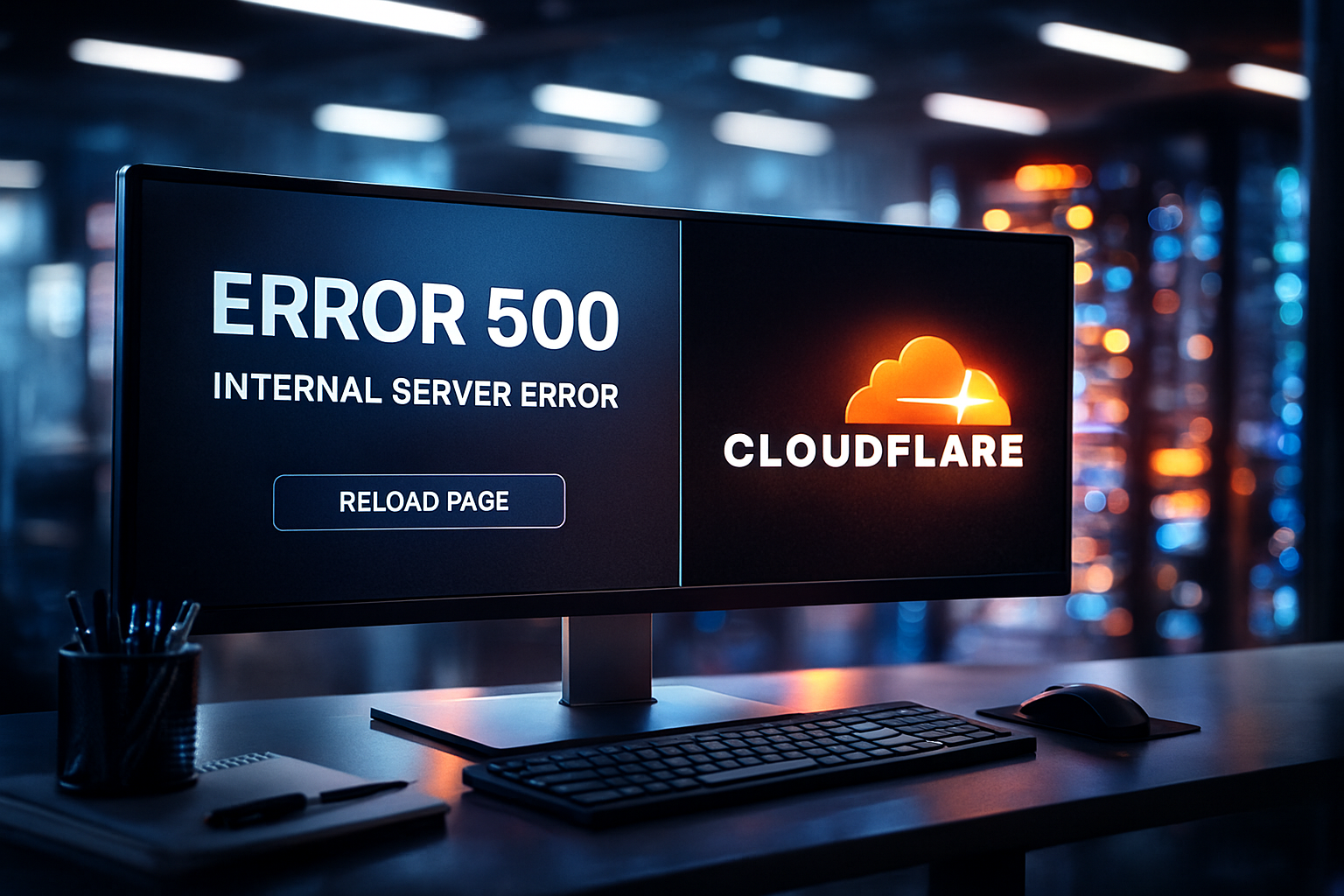
November 18, 2025 — MAG212NEWS
A significant outage at Cloudflare, one of the world’s leading internet infrastructure providers, caused widespread disruptions across major websites and online services on Tuesday. The incident, which began mid-morning GMT, temporarily affected access to platforms including ChatGPT, X (formerly Twitter), and numerous business, government, and educational services that rely on Cloudflare’s network.
According to Cloudflare, the outage was triggered by a sudden spike in “unusual traffic” flowing into one of its core services. The surge caused internal components to return 500-series error messages, leaving users unable to access services across regions in Europe, the Middle East, Asia, and North America.
Impact Across the Web
Because Cloudflare provides DNS, CDN, DDoS mitigation, and security services for millions of domains — powering an estimated 20% of global web traffic — the outage had swift and wide-reaching effects.
Users reported:
- Website loading failures
- “Internal Server Error” and “Bad Gateway” messages
- Slowdowns on major social platforms
- Inaccessibility of online tools, APIs, and third-party authentication services
The outage also briefly disrupted Cloudflare’s own customer-support portal, highlighting the interconnected nature of the company’s service ecosystem.
Cloudflare’s Response and Restoration
Cloudflare responded within minutes, publishing updates on its official status page and confirming that engineering teams were investigating the anomaly.
The company took the following steps to restore operations:
1. Rapid Detection and Acknowledgement
Cloudflare engineers identified elevated error rates tied to an internal service degradation. Public communications were issued to confirm the outage and reassure customers.
2. Isolating the Affected Systems
To contain the disruption, Cloudflare temporarily disabled or modified specific services in impacted regions. Notably, the company deactivated its WARP secure-connection service for users in London to stabilize network behavior while the fix was deployed.
3. Implementing Targeted Fixes
Technical teams rolled out configuration changes to Cloudflare Access and WARP, which successfully reduced error rates and restored normal traffic flow. Services were gradually re-enabled once systems were verified stable.
4. Ongoing Root-Cause Investigation
While the unusual-traffic spike remains the confirmed trigger, Cloudflare stated that a full internal analysis is underway to determine the exact source and prevent a recurrence.
By early afternoon UTC, Cloudflare confirmed that systems had returned to pre-incident performance levels, and affected services worldwide began functioning normally.
Why This Matters
Tuesday’s outage underscores a critical truth about modern internet architecture: a handful of infrastructure companies underpin a massive portion of global online activity. When one of them experiences instability — even briefly — the ripple effects are immediate and worldwide.
For businesses, schools, governments, and content creators, the incident is a reminder of the importance of:
- Redundant DNS/CDN providers
- Disaster-recovery and failover plans
- Clear communication protocols during service outages
- Vendor-dependency risk assessments
Cloudflare emphasized that no evidence currently points to a cyberattack, though the nature of the traffic spike remains under investigation.
Looking Ahead
As Cloudflare completes its post-incident review, the company is expected to provide a detailed breakdown of the technical root cause and outline steps to harden its infrastructure. Given Cloudflare’s central role in global internet stability, analysts say the findings will be watched closely by governments, cybersecurity professionals, and enterprise clients.
For now, services are restored — but the outage serves as a powerful reminder of how interconnected and vulnerable the global web can be.

